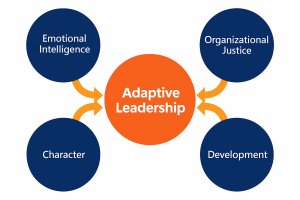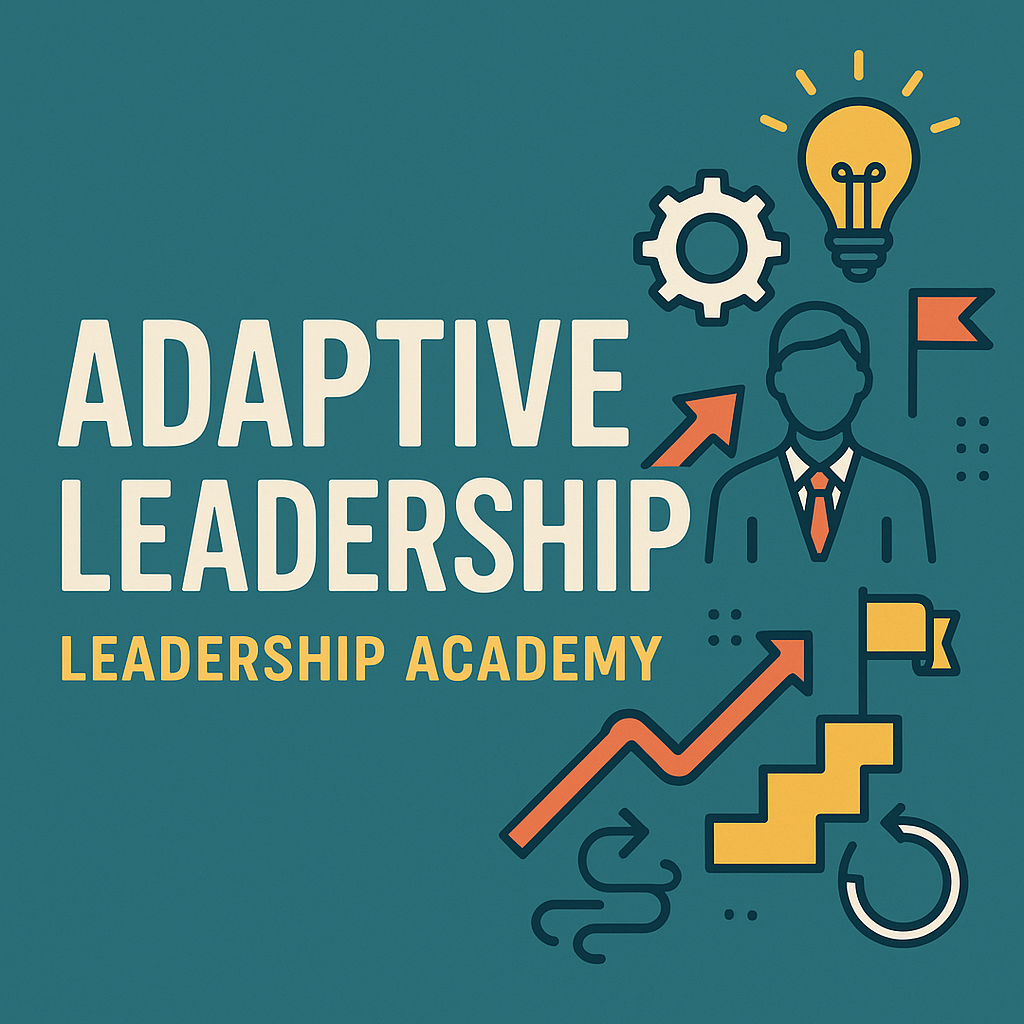Adaptive Leadership is a cornerstone of leadership development at the Leadership Academy, designed to prepare professionals for the unpredictable and rapidly evolving challenges of today’s business world. In an era where change is constant and complexity is the norm, traditional leadership methods often fall short. Adaptive Leadership provides a practical and powerful framework that enables leaders to confront tough issues, embrace uncertainty, and mobilize teams toward shared goals.
At the Leadership Academy, we integrate Adaptive Leadership into our executive education programs to help leaders cultivate emotional intelligence, resilience, and the ability to respond strategically to change. Participants learn how to distinguish between technical problems and adaptive challenges, engage stakeholders effectively, and foster a culture of innovation and continuous improvement. Our expert-led, experiential learning environment encourages reflection, real-time problem-solving, and peer collaboration. By mastering Adaptive Leadership, professionals gain the confidence and skills needed to lead through disruption, influence transformation, and create lasting impact across industries.
What is Adaptive Leadership?
Adaptive Leadership is a practical leadership framework developed by Harvard scholars Ronald Heifetz and Marty Linsky. Unlike traditional leadership models that focus on authority and technical problem-solving, Adaptive Leadership focuses on navigating change, mobilizing people, and addressing systemic challenges that lack clear solutions.
It equips leaders to diagnose the difference between technical problems (solved with expertise and routine processes) and adaptive challenges (requiring learning, innovation, and shifts in mindset or behavior).
At the heart of Adaptive Leadership is the belief that leadership is not a role or a title it’s a behavior. Anyone, at any level, can practice Adaptive Leadership to bring about change.
Why Adaptive Leadership Matters Today?
Organizations today face unprecedented challenges: technological disruption, global competition, climate change, social justice movements, and evolving workforce expectations. These are adaptive challenges complex, multifaceted, and often emotionally charged.
Traditional leadership often fails in these scenarios because it relies on known solutions. Adaptive Leadership, on the other hand, helps leaders and organizations embrace ambiguity, engage stakeholders, and experiment with innovative responses.
That’s why Leadership Academy has integrated Adaptive Leadership into its core leadership training programs to help professionals become not just managers of change, but catalysts of transformation.
Key Adaptive Leadership Styles in Practice at the Leadership Academy
Collaborative Leadership
- Traits: Empathy, shared decision-making, listening culture.
- Usage: In organizations where innovation and cross-functional teamwork are essential.
- Example: Tech companies like Google encourage flat hierarchies and idea sharing.
Transformational Leadership
- Traits: Visionary, inspirational, empowering.
- Usage: In times of major organizational change or digital transformation.
- Example: A CEO leading a company through ESG integration and sustainability initiatives.
Facilitative Leadership
- Traits: Coaching, guiding rather than commanding, enabling others.
- Usage: In matrixed organizations or teams practicing Agile methodologies.
- Example: Scrum masters and Agile coaches fostering continuous improvement.
Situational Leadership
- Traits: Flexibility, contextual decision-making.
- Usage: Varies leadership style based on employee maturity and task complexity.
- Example: Managers adapting their approach between new hires and seasoned experts.
Servant Leadership
- Traits: Focus on team well-being, humility, empowerment.
- Usage: Increasingly found in purpose-driven or non-profit organizations.
- Example: Leaders in B Corps or NGOs focusing on social impact.
Core principles of adaptive leadership
Our Adaptive Leadership curriculum at the Leadership Academy is based on several core principles that help leaders succeed in uncertainty.
- Emotional intelligence. Adaptive leaders are sensitive to the feelings of others. They know that change isn’t easy. Their empathy has the added bonus of boosting morale throughout the organization because it builds trust. A workforce that feels heard and supported is much more likely to put in the hard work it takes to help achieve company goals.
- Organizational Justice. Another fundamental principle of adaptive leadership is fostering a culture of honesty. Adaptive leaders know the best policies to introduce for the good of the organization. They also know the best ways to introduce these changes so that people embrace them. Adaptive leaders are willing to accommodate other peoples’ views, hence, assuring them that they are valued and respected.
- Development. Adaptive leaders love trying new things (strategies, processes, etc.), especially if it helps the organization succeed and be better prepared for change. They also have the propensity to innovate and experiment, and are not afraid to fail in the process. Perhaps most importantly, they encourage and empower employees to reach their full potential.
- Character. This principle points to earning respect from those you lead. Again, transparency is key. The leader needs to be completely open and comfortable with admitting mistakes and saying stop when something isn’t working. As much as they welcome change, an adaptive leader also embraces diversity and finds a way for it to benefit the entire company.

What You’ll Learn in Leadership Academy’s Adaptive Leadership Program
Our Adaptive Leadership training program is designed for mid-career professionals, senior leaders, and executives looking to develop practical strategies for leading through disruption.
Program Highlights:
- Real-world case studies on navigating adaptive challenges in corporate, nonprofit, and public sector settings
- Interactive workshops on diagnosing challenges, leading change, and stakeholder engagement
- Leadership simulations and role-playing to build decision-making and negotiation skills
- Mentoring and coaching from experienced adaptive leaders and faculty
- Peer-to-peer learning with a global cohort of forward-thinking professionals
Our curriculum at Leadership Academy is not theoretical it’s built around action learning, ensuring you leave with a toolkit you can apply immediately in your own organization.
Benefits of Learning Adaptive Leadership
When you invest in learning Adaptive Leadership at Leadership Academy, you will:
- Lead with Confidence in Uncertainty – Gain the skills to navigate volatility, ambiguity, and complexity with clarity and purpose.
- Build Resilient Teams – Foster collaboration, trust, and innovation in diverse teams and environments.
- Accelerate Change – Turn resistance into engagement by involving stakeholders and managing emotions effectively.
- Enhance Strategic Thinking – Learn to spot patterns, assess risks, and make informed decisions in dynamic contexts.
- Future-Proof Your Career – Organizations now value agile, emotionally intelligent leaders. Adaptive Leadership positions you as a top-tier talent ready for the future.
Adaptive Leadership in Action: Success Stories
Graduates from our Adaptive Leadership programs have gone on to lead major transformations in healthcare, education, finance, government, and tech sectors. Whether it’s a CEO steering a company through digital disruption, or a nonprofit director aligning teams across continents, the tools of Adaptive Leadership make real-world impact.
Here’s what one of our alumni had to say:
“Leadership Academy’s Adaptive Leadership program gave me the clarity to lead my team through a merger. I learned how to manage resistance, engage stakeholders, and make bold decisions. It changed how I lead forever.”
— Farhana R., Senior Strategy Director
Why Choose Leadership Academy?
Leadership Academy is a trusted global institution known for its cutting-edge leadership development programs. Our faculty combines academic excellence with real-world experience, ensuring that our curriculum is both insightful and actionable.
We offer:
- Certified programs backed by research
- Hybrid learning options (online + in-person)
- Lifelong alumni network and career support
- Personalized learning journeys based on your goals
When you join Leadership Academy, you’re not just learning—you’re becoming part of a global community of changemakers.
Key Takeaways
Although adaptive leadership requires a great deal of effort, it provides substantial returns. Based on credible statistics, firms that are adaptive end up with immense gains both financially and operationally. They are able to weather storms and rise to the top even during periods of volatility.
In summary, adaptive leadership can be summed up using four main principles: distributed leadership, optimal talent mix, possessing a transparent character, and developing mutual trust. With regards to distributed leadership, the leader delegates roles to team members.
An optimal talent mix entails using everyone’s skills rather than just those of top-level executives. A clear charter means that the company or team follows well-defined goals, duties, and ground rules, while trust helps to foster strong bonds among employees, employers, and clients.

